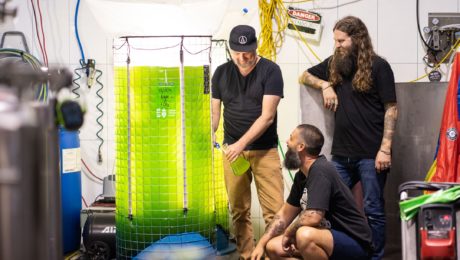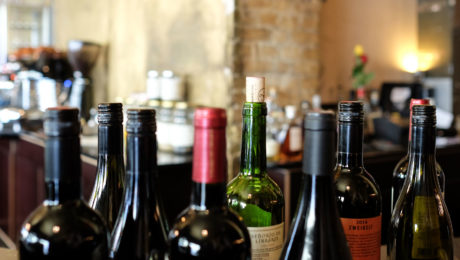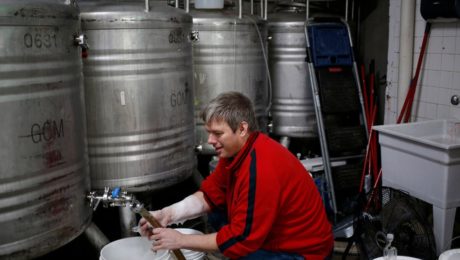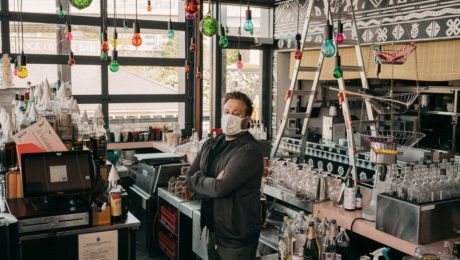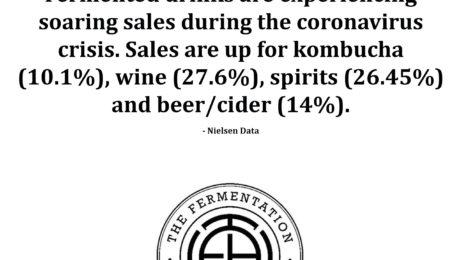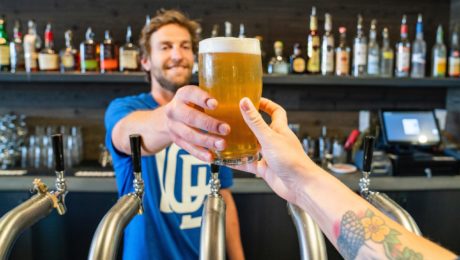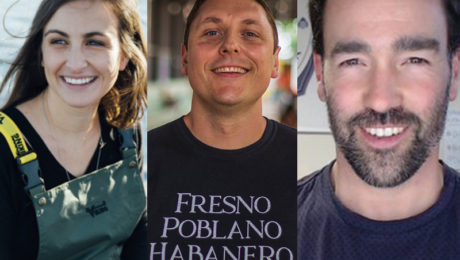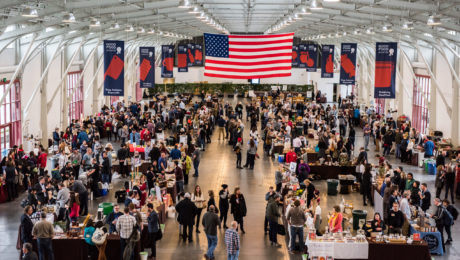Recycling Brewery Carbon Dioxide Emissions
A brewery in Sydney, Australia is getting creative with the carbon dioxide emissions produced by yeast during fermentation. Young Henrys, with the help of a local university, is feeding those fermentation gases into tanks of native river algae that turn that CO2 back into oxygen. This process neutralizes the emissions. The CO2 produced to make one six pack of beer would take a tree two days to absorb.
“You have this really amazing yin and yang scenario,” said Oscar McMahon, Young Henrys co-founder. “One tank of algae is capable of creating the equivalent amount of oxygen as one hectare of Australian bush. It takes a long time to grow that, whereas we can grow a tank of algae within weeks.”
Read more (Bloomberg)
- Published in Business
New Tariffs Threaten Wine & Spirits Industry
Leaders of the wine industry are asking the community to rally and appeal tax hikes. As the industry continues reeling from losses related to COVID-19, a new round of potential tariff hikes threatens the industry. In 2020, a 25% tariff imposed on certain European wines and cheeses was described by some as the greatest threat to the wine and spirit industry since the prohibition era. U.S. President Donald Trump imposed the tariffs in retaliation for a tax imposed in France on several large American tech ferns, such as Facebook, Google and Airbus.
Read more (Vinepair)
- Published in Business
Brewers Using Yeast Strains Now for Bold Flavor
Hops used to be the biggest thing in beer to create a powerful flavor — now it’s yeast strains. Brewers are using yeast strains from around the globe for the best flavor.
According to the New York Times: “For some time, it’s been a hopped-up arms race as breweries regularly double or triple the amount of hops to create stronger aromas. With breweries using the same hops, many beers are starting to smell alike. … In search of distinct aromas, brewers are embracing yeast and bacteria strains from across the globe. They’re creating beers that let each type of microbe speak its unique language, and drinkers are listening.”
DeWayne Schaaf, owner of @ebbandflowfermentations Ebb & Flow Fermentations brewery in Missouri, calls himself a “yeast nerd.” He does not use commercial yeasts in his drinks, instead fermenting with yeast strains from Scandinavian farms, bottles of Spanish natural wine and Colorado dandelions. Few hops are required in his drinks as, during fermentation, the yeast converts sugars into alcohol for the flavors.
Other fermenters featured in the article include: @omegayeast Omega Yeast (supplier of yeast strains in Chicago), Berg’n (a beer hall in New York), @alvaradostreetbrewery Alvarado Street Brewery (brewery in California), @yeastofeden Yeast of Eden (brew pub in California), @bootlegbiology Bootleg Biology (yeast lab in Tennessee), @whitelabsyeast White Labs (yeast supplier in North Carolina and California) and Lars Marius Garshol (Norwegian author of “Historical Brewing Techniques: The Lost Art of Farmhouse Brewing
Read more (New York Times)
- Published in Business, Food & Flavor
Over 200 Breweries Release “Black is Beautiful” Collaborative Stout
Weathered Souls Brewing Co., a black-owned brewery in Texas, has launched the Black is Beautiful initiative to bring awareness to racial injustice and “show that the brewing community is an inclusive place for everyone of any color.” They are encouraging breweries to develop their own Black is Beautiful stout. Weathered Souls has shared a stout base recipe, and ask breweries to develop their own creative spin on the drink. A free label has been provided on their website, and the campaign encourages breweries to donate a portion of sales of the stout go to local foundations that support police reform and legal defenses.
Stout is a top-fermented beer that ranges in color from dark brown to almost black.
Marcus Baskerville, founder and head brewer at Weathered Souls, told the San Antonio Current: “The brewing industry is pretty eclectic, with all kinds of different people in it. Why wouldn’t this community be one to join together to support a message of equality and purpose to support the concept of general respect for everybody?”
Read more (San Antonio Current)
- Published in Business
Craft Breweries Once Surging, Now Shuttering
Craft breweries, which were heading into their second decade of a major boom, are now shuttering during the coronavirus pandemic. “There’s going to be a lot of dead distilleries coming out of this,” said Paul Hletko, the founder and distiller of FEW Spirits, in Evanston, Ill. “Even if you survive, the new normal is going to be punishing for small brands.” Craft distilling relies on bars, tasting rooms, face-to-face sales and customers willing to pay a higher price for a premium product — all factors dramatically changing with social distancing and a global recession.
Read more (The New York Times)
- Published in Business
Sales of Fermented Drinks Soar During Coronavirus
Fermented drinks are experiencing soaring sales during the coronavirus crisis. Sales are up for kombucha (10.1%), wine (27.6%), spirits (26.45%) and beer/cider (14%). (Nielsen Data)
- Published in Business
New CARES Act Provides Stimulus to Breweries, Cideries
Craft alcohol producers, who asked the government for assistance this month, may now obtain SBA loans interest free to help maintain payroll, mortgage, rent and utilities during the coronavirus outbreak. The CARES act was designed to incentivize small businesses to avoid layoffs. Craft breweries and cideries who were forced to close breweries, bars, wineries and taprooms this month during the coronavirus outbreak. The Emergency Disaster Loans will provide assistance up to $10,000. ..Both the Brewers Association (BA) and the American Cider Association praised the stimulus package, but noted it’s not perfect.
“This this is a significant step forward that provides much needed relief for small and independent breweries who are facing dire economic challenges, there is more work to be done,” according to a statement by the BA.
Read more (Beverage Daily)
- Published in Business
Bubbling Over: Is Fermentation More Than a Fad
We asked three fermentation experts if recent popularity of fermented foods is a fading trend or a new food movement. These industry professionals weigh in on their predictions for fermentation’s future. The fermenters include: Bri Warner (CEO of Atlantic Sea Farms, a commercially viable seaweed farm that makes kelp kraut and kimchi), Nicholas Gregory (owner of Pulp Hot Sauce, an Atlanta-based fermented condiment brand), Joshua Rood (co-founder and CEO Dr Hops Kombucha beer, a health-conscious alcohol).
Do you think the surge of fermented food and drinks is a trend will disappear or a new food movement here to stay?
Bri Warner, CEO Atlantic Sea Farms: “Now that we have a robust understanding of how good gut health effects overall health, I think fermentation is here to stay. I do think the category will continue to innovate to remain relevant, with a stronger focus on quality ingredients that are good for people, planet, and, in our case, oceans!”
Nicholas Gregory, owner Pulp Hot Sauce: “I think the current fermented food movement is here to stay. We are at an intersection of technology, science and health further than we have ever seen in human history. The internet, television, several seminal books and air travel have given us unprecedented exposure and access to information. This exposure and access to food and world cultures is more in depth than ever before. Including the food history and traditions of those cultures. Combine that awareness with a relatively intelligent and sophisticated medical system; an understanding of healthy lifestyles, a willingness to make healthy decisions, an understanding of the benefits of a healthy gut biome and how it all correlates to a longer, happier, healthier life. Along with a craving for umami and fermented funky flavors for a growing number of the population. I believe we are in the middle of a movement that shows no signs of slowing down or going away anytime soon. In fact, I see it only becoming more popular, more normal, more accepted, more diverse, more creative and more exciting in the decades to come.”
Joshua Rood, co-founder and CEO Dr Hops Kombucha beer: “As co-founder and CEO of Dr Hops Kombucha Beer, I appreciate that there is currently a powerful trend towards living, fermented foods. But answering the question of whether or not that will continue is repugnant. We here at Dr Hops are driving that trend! We are not playing the game of hoping that it will simply continue. We are committing ourselves, each day, to the life-enhancing awesomeness of fresh, authentic, fermented foods and beverages. Please join us in that! Join us in leading the health-conscious food and beverage revolution!”
- Published in Business
Dozens of Fermented Food & Drink Brands Win Good Food Awards
Fermented food and beverages reigned at the 2020 Good Food Awards. The annual Good Food Awards honors American craft food producers. Over a hundred fermented brands beat out 1,835 entrants to take home top honors.
Craft food makes over $200 billion in revenue a year. The 17 categories include: beer, charcuterie, cheese, chocolate, cider, coffee, confections, elixirs, fish, grains, honey, oils, pantry, pickles, preserves, snacks and spirits.
From the Good Food Foundation: “For a long time, certifications for responsible practices and awards for superior taste have remained distinct – one honors social and environmental responsibility, while the other celebrates craftsmanship and flavor. The Good Food Awards recognizes that truly good food – the kind that brings people together and builds strong, healthy communities – contains all of these ingredients.”
Read our article for an overview on the fermentation brands that won awards this year.
1000 Faces Coffee – Luis Ordoñez (Athens, Georgia). With a “mission to connect the coffee consumers and coffee producer,” 1000 Faces Coffee is a coffee roaster that travels to countries of origin to work with producers.
21 Degrees Estate Cacao Farm – Kahalu`u Gold (Kaneohe, Hawaii). A family-operated boutique cacao farm on the windward side of the island of Oahu. 21 Degrees sells chocolate and offers tours.
Albemarle CiderWorks – Harrison (North Garden, Virgina). A 20-year-old apple orchard, CiderWorks makes 15 varieties of cider in their cideries, selling by the bottle or by glass in their taproom.
Aldi – VitaLife Organic Ginger Awakening Kombucha (Batavia, Illinois). The fermented tea is made by VitaLife, a brand made by the discount supermarket chain Aldi.
Allagash Brewing Company – Crosspath (Portland, Maine). This independent craft brewer sells beers using a traditional, Belgian method of spontaneous fermentation.
Almanac Beer Co – Apricot Sournova (Alameda, California). Farm-to-barrel brewing, Almanac uses mixed-culture to make their beers, which allows continuous fermentation over months with real fruit in oak barrels.
Apologue Spirited Liqueurs – Saffron Liqueur (Chicago, Illinois). A locally-sourced liquer maker that “elevate classic cocktail recipes.”
Askinosie Chocolate – Dark Chocolate & Red Raspberry CollaBARation™ Bar (Springfield, Missouri). One of Forbes’ 25 Best Small Companies In America, Askinosie Chocolate uses single origin, Direct Trade cocoa beans.
Atlantic Sea Farms – Sea-Chi (Saco, Maine). The first commercially viable seaweed farm in the U.S., Atlantic Sea Farms was founded in 2009. The clean, fresh Sea-Chi is made with raw kelp, cabbage and radish.
Backyard Beans Coffee Co. – Ethiopia Basa (Lansdale, Pennsylvania). A coffee roaster using responsibly sourced coffee beans, the light roast is an Ethiopian heirloom variety.
Barrington Coffee Roasting Company – Gera (Lee, Massachusetts). Sustainable coffee with delicate violet and blueberry aromas with fruit flavors of strawberry, peach and hard candy and soft tones of cocoa, molasses and licorice root.
Beltex Meats – Pate Forestier (Salt Lake City, Utah). A nose-to-tail, whole animal butcher sourcing regional meat, Beltex Meat’s Pate Forestier is part of the in-house charcuterie program. It’s comprised of pork shoulder and liver, chicken liver, and foie gras.
Big B’s Hard Cider – Harry Masters Jersey (Hotchkiss, Colorado). A farmstead hard cider made with fruit from the orchard and fermented in the cidery.
Big Easy Bucha – Bayou Berry Kombucha (New Orleans, Louisiana). A kombucha brand fermented with Southern flavors. Bayou Berry is infused with strawberry and honeysuckle.
Blackberry Farm – Sobrasada (Walland, Tennessee). Sobrasada is Blackberry Farm’s version of a raw, cured, fermented Spanish sausage, made from American Iberico pigs raised at White Oak Pastures in southern Georgia.
Blackberry Farm – Brebis (Walland, Tennessee). Blackberry Farm’s seasonal fresh sheep’s milk cheese.
Blackberry Farm – Hawkins Haze (Walland, Tennessee). An ashed surface-ripened sheep’s milk cheese named after the Hawkins line that runs through the property.
Blue Bus Cultured Foods – Local Cortido (White Salmon, Washington). A sauerkraut popular in Salvadoran cuisine, the organic kraut is made with cabbage, carrots, onions, garlic and spices.
Bourbon Barrel Foods – Imperial Double Fermented Soy Sauce (Louisville, Kentucky). Naturally brewed, double fermented soy sauce. It is aged in bourbon barrels and features earthy flavors.
California Fish Sauce – Koji Fish Sauce (Pleasanton, California). The first fish sauce in the U.S. that is compliant with FDA and FDB regulations, from harvesting anchovies to fermentation and finished product.
Capriole – Sofia (Greenville, Indiana). A sweet, dense, ripened goat cheese from local goats.
Cascadia Creamery – Sleeping Beauty (Trout Lake, Washington). A buttery and sharp cheese with a natural rind, aged 75 to 100 days.
Case Coffee Roasters – Ethiopia Dimtu (Ashland, Oregon). Sustainably sourced coffee from beans all over the globe. Roasted in small batches for sweeter, complex flavors.
Casella’s Salumi Speciali – Casella’s Prosciutto Speciale (Hurleyville, New York). An American made meat made using Italian tradition. Slow, on-the-bone curing.
Castronovo Chocolate – Tumaco, Colombia Dark Milk 60% (Stuart, Florida). A dark milk chocolate made with cocoa from the Pacific coast of Colombia. The cacao beans are foraged in indigenous forests, then fermented and dried in an onsite facility using solar panels.
Champlain Orchards Cidery – Honeycrisp (Shoreham, Vermont). A single-varietal cider using fresh-pressed Honeycrisp apples. All apples are pressed, fermented, and crafted at the orchard.
Champlain Orchards Cidery – Redfield – Estate Series (Shoreham, Vermont). Made with estate grown Redfield apples. These red crab apple hybrids create a fragrant, sour cherry flavor.
Chequessett Chocolate – White Lemon Thyme Bar (North Truro, Massachusetts). A white chocolate with lemon and thyme, the chocolate-making process begins with high-quality beans, then a flavor developed during fermentation.
Cherry Grove Farm – Havilah (Lawrenceville, Nj, New Jersey). Cheese from the cows at Cherry Grove Farm, a sustainable farm. Batches are aged 14 to 16 months.
Cleophus Quealy Beer Company – Frambozenbier (San Leandro, California). Sour red ale barrel-aged with raspberries. Small batches are brewed seven barrels at a time.
Compelling Coffee – Ethiopia Bedhatu Jibicho (Los Angeles, California). Beans are fermented in ceramic tile tanks filled with clean spring water for 24 hours. The beans are then fermented a second time for another 24 hours.
Creo Chocolate – Caramelized Milk Chocolate (Portland, Oregon). The fruit inside the cacao bean is fermented for 4- 7 days to bring out the flavor of the beans.
Crimson Cup Coffee & Tea – Kossa Kebena (Columbus, Ohio). From Crimson Cup’s line of Friend2Farmer direct-trade coffees, Kossa Kebena is produced from heirloom cacao beans naturally fermented on raised beds.
Cutwater Spirits – Three Sheets Cask Strength Rum (San Diego, California). Crafted from pure cane sugar rather than molasses, the rum is distilled in a hybrid pot-and-column still.
Daniel’s Artisan – Bonneville (Ferndale, Washington). Traditional, artisan cheese made through Ferndale Farmstead cheese company. Ferndale uses a seed-to-cheese philosophy, only using milk they produce from cows they raise, fed from crops they grow.
Equator Coffees – Panama Hacienda La Esmeralda Gesha (San Rafael, California). A light roast sustainably sourced from Panama, it features flavors of peach, apricot and Meyer lemon.
Falcon Spirits Distillery – Aperitivo Aplomado (Richmond, California). A blend of 26 high-quality herbs, roots, flowers and fruits with no artificial flavors. Made in small batches that take two months to create.
Fra’ Mani Handcrafted Foods – Salame Toscano (Berkeley, California). All natural pork made in the Tuscan tradition.
Fruition Chocolate – Spring Salted Dark Milk 56% (Shokan, New York). Seeds from pods are fermented in bins and covered with burlap or banana leaves for 3-8 days.
Fullsteam – Farm’s Edge: Barrel-Aged Ava (Durham, North Carolina). A mixed culture saison made with foraged wild grape leaves and elderflower and rested in red wine barrels.
Goat Rock Cider Company – Rosé Cider (Healdsburg, California). A fruit cider made by co-fermenting local, organic apples with Hawaiian passion fruit.
Goodnow Farms Chocolate – Special Reserve with Las Palomas Coffee (Sudbury, Massachusetts). A single-origin coffee and cacao bar, the chocolate is a fruity flavor thanks to the Guatemalan coffee beans.
Gowan’s Heirloom Cider – Macintosh Applewine Cider (Philo, California). A farm-to-table cider, the Macintosh apples used in the cider are grown at Gowan orchards to be pressed, fermented and bottled at the farm.
Gowan’s Heirloom Cider – Gravenstein Cider (Philo, California). Called summer in a glass, the cider is made using fresh Gravenstein apples from the farm’s heritage orchards.
Green Dirt Farm – Fresh – Plain (Weston, Missouri). A fresh, spreadable cheese.
Gypsy Circus Cider Company – PuppetMaster: Whiskey Barrel Vaudevillian (Kingsport, Tennessee). A wild cider aged in whisky barrels for 15 months with apricots.
H+S Coffee Roasters – Kenya Chwele (Laramie, Wyoming). A Kenyan coffee with complex flavors of raspberry, black plum, sour skin, cherry taffy, mango, tropical fruits and stone fruits.
Hemly Cider – Sloughouse Jalapeno Pear Cider (Courtland, California). Made on a six-generation farm, the cider starts with hand-picked Bartlett pears blended with estate grown Gala apples.
HOSAco – The Standard Fermented Hot Sauce (Bellingham, Washington). A condiment made in small batches with all-natural ingredients. Chiles are hand processed and fermented for a minimum of six weeks.
Idyll Farms – Mont Idyll (Northport, Michigan). Named a “Best Artisanal Cheese” by Food & Wine Magazine, the soft ripened rind is delicately painted with vegetable ash.
Incontro Cured – Salame di Bue (Richmond, California). Made from a Sanke River Farms American Wagyu.
Incontro Cured – Salame Sicilia (Richmond, California). Salame honoring the Sicilian lineage, it’s made from ingredients growing wildly throughout the Island of Sicily, Italy.
JAZ Spirits – Cold Tree Gin (Clackamas, Oregon). Inspired by the elegant old growth forests of Oregon, a spirit crafted with flavors of botanical, fruit and old tree harvests.
JAZ Spirits – Verstovia Spruce Tip Vodka (Clackamas, Oregon). A vodka foraged from the coastal forests of the Pacific Northwest, distilled with the fresh green tips of Sitka Spruce trees.
JBC Coffee Roasters – Janson Geisha Lot #109 (Madison, Wisconsin). Direct trade coffee that is named one of the best coffee roasters by Forbes.
Kickapoo Coffee – Kenya Mbeguka (Viroqua, Wisconsin). Made with a Kenyan coffee bean, the coffee is made with a dry fermentation.
Klatch Coffee – Colombia Finca La Maria Geisha Natural (Rancho Cucamonga, California). The highest-scoring coffee at the 2019 U.S. Brewing Championships, the coffee has flavor notes of raspberry, black tea and floral flavors.
KMN Enterprises – K Bloody Mary Mix (Brooklyn, New York). Made in small batches using 87% organic ingredients.
Lakefront Brewing – Beerline Barleywine (Milwaukee, Wisconsin). The nation’s first organic barrel-aged barley wine in the U.S., the beer is held for 18 months in rye whiskey barrels.
Leopold Bros – Summer Gin (Denver, Colorado). Ingredients include Spanish blood oranges, French immortal flowers, juniper berries and Australian lemon myrtle.
Letherbee Distillers – Original Label Gin (Chicago, Illinois). Gin incorporated with a blend of 11 botanical spirits.
Liberty Ciderworks – English Style IV (Spokane, Washington).Classic cider in a aroma-rich, English-style cider.
Linea – Guatemala El Injerto Reserve (San Francisco, California).Coffee from Guatemala’s first carbon-neutral certified farm.
Little Apple Treats – Strawberry + Pink Peppercorn Shrub (Sebastopol, California). Fresh, organic strawberries and fresh, organic pink peppercorn leaves and fruit combine with award-winning apple cider vinegar. It contains live vinegar mother, so it’s potent with probiotics.
Little Beast Brewing – Bes – Tart Wheat Ale (Beaverton, Oregon). Brewed with Belgian malts, Lemon Drop Hops and chamomile flower then fermented with a blend of unique Saccharomyces yeast and conditioned with Lactobacillus.
Little Beast Brewing – Golden Stone (Beaverton, Oregon). A blend of peaches, nectarines and apricots gives a luscious elegance to this farmhouse ale. Prevailing notes of vanilla, toasted French oak & juicy stone fruit.
Loma Coffee – Ethiopia Shantawene Village – Anaerobic Process (Portland, Oregon). Heirloom coffee from Ethiopia, this coffee is anaerobic fermented and tastes floral, sweet and complex.
Love Hard, Inc. – Jojo’s Sriracha – OG (Pueblo, Colorado). Handmade Sriracha made with chile peppers from small farms in Pueblo, Colorado. The chili peppers are harvested in-season and fermented for several months.
Madrone Cider – The Reserve Blend (Friday Harbor, Washington). Naturally fermented in bottle, apples are sourced from Bellevue Farms on San Juan Island, Washington. The hard cider apples are bred specifically for flavor.
Mudhouse Coffee Roasters – Moras Negras, Mi Finquita Coffee Farm (Charlottesville, Virginia). A sundried, natural processing style, the coffee features complex fruit and floral flavors.
My Artisano Cheeses – Ervie Cheese (Cincinnati, Ohio). Washed rind soft cheese with balanced cream, and yeasty notes. Amild version of Belgian washed rind cheeses.
Napili Fresh Local Organic Farm – Pineapple, Ginger, Turmeric Sauerkraut (Lahaina, Hawaii). Artisanal, naturally fermented sauerkraut made in Hawaii with organic ingredients.
Napili Fresh Local Organic Farm – Gut Shots (Lahaina, Hawaii). Kimchi gut shots handcrafted in Maui.
Nettle Meadow Farm – Kunik (Warrensburg, New York). Artisanal goat cheese made on a 100-acre farm.
Oak Cliff Coffee Roasters – Carmen Geisha (Dallas, Texas). A micro-roaster, the Carmen Geisha is a small batch sourced from Finca Carmen in Volcán, Panama
OlyKraut – Eastern European Sauerkraut (Olympia, Washington). One of the most popular flavors, the caraway seeds and apple give it a distinct flavor in the live probiotic kraut.
OlyKraut – Organic Smoke & Kale Sauerkraut (Olympia, Washington). Combines smoked chiles with local kale bounty from Pacific Northwest farmers.
Olympia Provisions – Chorizo Rioja (Portland, Oregon). A Spanish-style salami with both sweet and smoked paprika, garlic and oregano.
Olympia Provisions – Rosette de Oregon (Portland, Oregon). A French-inspired salami made with all Oregon ingredients: Oregon pork, pinot noir, rosemary, juniper, and sea salt.
Oregon Brineworks – Sauerkraut (Hood River, Oregon). Naturally fermented, raw sauerkraut made with organic, lacto-fermented vegetables.
Pagosa Brewing & Grill – Cool Cucumber Wheat (Pagosa Springs, Colorado). A fruit beer infused with fresh cucumbers.
Pappy & Company – Pappy Van Winkle Bourbon Barrel Aged Pure Maple Syrup (Louisville, Kentucky). A one-of-a-kind syrup bursting with flavors of vanilla, butter, oak and bourbon. Aged in Pappy Van Winkle bourbon barrels.
Patric Chocolate – 67% Madagascar (Columbia, Missouri). A limited release bar made from American craft chocolate company from the cocoa bean.
Patric Chocolate – 67% Piura Peru (Columbia, Missouri). Peru cacao beans create chocolate with ruby grapefruit, toasted almonds and sun-dried wine grapes.
Pennyroyal Farm – Reserve Boont Corners (Boonville, California). Made of fresh, raw milk, it is inspired by French cheese as a means of preserving nutrients from the abundant summer milk.
Penstock Coffee – Taaroo Mill, Ethiopia (Highland Park, New Jersey). The coffee is fermented for 24-36 hours, then dried for 12-20 days. The coffee is intensely sweet with heavy fruits.
Perennial Artisan Ales – Giant Steps: Blend 2 (St. Louis, Missouri). A 50/50 blend of two distinct threads: Half puncheon fermented mixed culture saison with grapefruit zest and juice, and half barrel fermented clean saison aged on 2nd use raspberries and blackberries.
Port City Brewing Company – Optimal Wit (Alexandria, Virginia). A a Belgian Witbier style beer, Optimal Wit includes ingredients like Virginia-grown wheat, Spanish orange peels, and coriander.
Port City Brewing Company – Rivershed Ale (Alexandria, Virginia). An American Pale Ale (APA) style beer, Rivershed Ale is dry-hopped with 100% locally sourced grain.
PUSH X PULL COFFEE – Ethiopia Sidama Shantawene Anaerobic Process (Portland, Oregon). Ethiopian coffee with flavors of strawberries and tangerine.
Real Pickles – Organic Nettle Kraut (Greenfield, Massachusetts). Naturally fermented, small batch kraut, infused with Vermont nettles.
Real Pickles – Organic Beet Kvass (Greenfield, Massachusetts). Fermented infusion of beets, onions and savory herbs.
Red Rooster Coffee Roaster – Ethiopia Nansebo Worka (Floyd, Virginia). This washed process organic coffee is sourced from the Zenebe Simbret Washing Station, Flavors include honeysuckle and rose aroma, sweet ripe plum, fresh apricot and pomegranate acidity.
Reuben’s Brews – Hazealicious IPA (Seattle, Washington). An IPA with tropical fruit notes, in particular passion fruit. The stars of the show are the big, bright hops with restrained bitterness providing balance.
Reverend Al’s Bona Fide Potents – Strawberry Peppercorn Shrub (Tacoma, Washington). Reverend Al’s Bona Fide Potents are a collection of all natural, nearly mystical, alchemetical concoctions– magical bitters, elixirs, tinctures and shrubs. Made with locally grown fruits and vegetables from family farms.
Salt and Savour – Apple Ginger Sauerkraut (Dunsmuir, California). Fermented, organic sauerkraut, handcrafted in small batches.
Salute! – Vicario Amore Mio Aperitivo (Greer, South Carolina). Made with a 115-year-old recipe using “vanishing” herbs, hard to find herbal ingredients that Salute now grows themselves.
Shrub Farm – Ginger & Hawaiian Chili Shrub (Bellingham, Washington). A spicy ginger and chili shrub. Shelf stable with a living culture with the Mother of vinegar.
Sierra Nevada Cheese Company – Bella Capra Raw Milk Monterrey Jacques (Willows, California). Made with raw cultured goat’s milk, the “complex array of flavors” results from “naturally occurring healthy micro-organisms present in our fresh milk.”
SILO Distillery – Vodka (Windsor, Vermont). Made with 100% Vermont corn, gluten-free and non-GMO.
Smoking Goose Meatery – Whey Fed Dodge City Salame (Indianapolis, Indiana). Old world style of meat curing with a new world flavor. The Dodge City Salame is a pork salame of fennel pollen and pink peppercorns.
Smoking Goose Meatery – Duck Prosciutto (Indianapolis, Indiana). Moulard duck breast with star anise, allspice and orange peel.
Speakeasy Ales & Lagers – Bootleggers Black Lager (San Francisco, California). Founded in 1997, Speakeasy Ales & Lagers is a San Francisco craft brewery bringing great beer from the underground to the masses. The brewery makes year-round and limited release beers.
Speckled Ax Wood Roasted Coffee – Ethiopia Jebicho (Portland, Maine). Coffee roaster in a vintage Italian Petroncini fired with local hardwood.
Spirit Works Distillery – Sloe Gin (Sebastopol, California). “Batch by batch – grain to glass.” Made with sloe berries, the crimson-colored gin has a unique sweet-and-sour taste.
Spyhouse Coffee Roasting Co. – Juan Domingo / Guatemala (Minneapolis, Minnesota). Rich flavors of chocolate hazelnut and deep fruitiness.
Steady State Roasting – La Pradera Mokka (Carlsbad, California). A Colombian coffee from the mokka tree.
Stem Ciders – New Hampshire Heritage (Lafayette, Colorado). Unfiltered cider made from a blend of bittersharp and bittersweet heirloom apples from a local orchard.
Stonecutter Spirits – Heritage Cask Whiskey (Middlebury, Vermont). The Heritage Cask Whiskey is distilled in Kentucky like a bourbon, aged in Vermont like an Irish whiskey, and finished like a Scotch.
Stormalong Cider – Light of the Sun (Sherborn, Massachusetts). A citrusy, refreshing cider dry-hopped with Citra & Ekaunot hops. At the time of dry-hopping, Stormalong Cider adds guava to enhance the tropical, citrusy taste which is on the drier side.
Sugar Bob’s Finest Kind – Smoked Maple Sriracha (Londonderry, Vermont). Made with real maple syrup, this all natural Smoked Maple Sriracha has become a cult favorite in the state.
Sweet Bloom Coffee Roasters – Mario Alarcon (Lakewood, Colorado). Specialty, ethical, sustainable coffee with limited release flavors, like Mario Alarcon.
The Cottage – Pickled West Indian Gherkin (Bluffton, South Carolina). Pickling cucumbers from The Cottage, a cafe and tea room founded in 1868.
The Juice Hive & Health Emporium – Shiso, Sweet Potato and Asian Sour Leaf Kimchi (Bluffton, South Carolina). A kimchi from the natural foods store.
The Juice Hive & Health Emporium – Watermelon Rind Kimchi (Bluffton, South Carolina). Another unique kimchi flavor from the natural foods store.
Top of the Hill Distillery – Organic Carolina Straight Wheat Whiskey (Chapel Hill, North Carolina). Made from North Carolina-grown wheat and U.S.-grown sugar cane. Fermented and distilled on-site in the distillery.
Treaty Oak Distilling – Ghost Hill Bourbon (Dripping Springs, Texas). Ghost Hill Bourbon is a unique whiskey made with local heirloom grains. A genuine grain to glass bourbon, it is mashed, fermented, distilled, barreled, aged 2 years and bottled on-site.
Underground Meats – Calabrian 3 Ways Salami (Madison, Wisconsin). Wisconsin-grown calabrian chillies, prepared three different ways
Urban Tree Hard Cider – Habanero Haze (Atlanta, Georgia). Spicy ginger infusion with hints of habanero zest.
Vibrant Coffee Roasters – Ethiopia Ardi Organic – Washed (Philadelphia, Pennsylvania). An organic Ethiopian coffee with citrus and sweet floral flavors.
Virtue Cider – The Mitten (Fennville, Michigan). A Michigan cider blend of last season’s pressed apples, aged in Bourbon barrels for up to one year, then back sweetened with this year’s fresh pressed apple juice. The Mitten has notes of vanilla, caramel, and charred oak.
Virtue Cider – Michigan Cherry (Fennville, Michigan). Michigan Cherry blends last year’s harvest of Michigan apples from local orchards that are aged in French oak barrels. Fresh-pressed juice from Michigan cherries is then added.
Vista Brewing – Stonewall Belgian Lambic-Style Ale with Texas Peaches (Driftwood, Texas). Lambic-style ale with Texas peaches.
Volpi Foods – Heritage Prosciutto (St. Louis, Missouri). Our heritage prosciutto is hand-rubbed, salted & air dried for a perfect melt-in-your-mouth texture.
Waialua Estate Chocolate – Hawaiian Milk Chocolate (Wahiawa, Hawaii). Waialua Estate’s Hawaiian cacao is grown along the banks of the Kaukonahua stream. Flavors include banana and pineapple notes, and flavors of dark cherry, berry and raisins.
White Label Chocolate – 58% Brown Butter Milk (Santa Cruz, California). Single origin chocolate bars fermented in a pair box design.
WildCraft Cider Works – Pisgah Heritage (Eugene, Oregon). Traditional farmhouse cider made with apples and English Hawthorne berries & blossoms.
Wise Goat Organics – Super Green Kraut (Hollister, California). Probiotic rich and full of raw, live cultures. Super Green Kraut is full of organic greens: cabbage, nettles, cilantro, morenga, spinach, parsley, chickweed and dandelion.
- Published in Business
Bottoms Up! Scientists Find Gut-Friendly Bacteria in Unpasteurized Beer
The same beneficial gut-friendly bacteria prevalent in yogurt is also in some beer, according to new research from scientists at Amsterdam University. Beer brands that ferment twice — once at the brewery, then a second fermentation in the beer bottle — are rich in probiotic yeast. This creates a sharp, dry taste in the beer that is “bursting with probiotic microbes.” Scientists found the brands using in-bottle fermentation use a different strain of yeast than traditional brewer’s yeast. Pasteurized beer and modern beer production processes have no probiotics. Their findings are supported by researchers from the University of Nebraska, who also found some beers contain a high amount of good probiotics. Professor Eric Classeen, a gut bacteria expert from Amsterdam University, said “You are getting a stronger beer that is very, very healthy. … In high concentrations, alcohol is bad for the gut but if you drink just one of these beers every day it would be very good for you.”
Read more (The Telegraph)
- Published in Science

